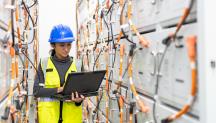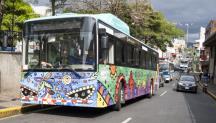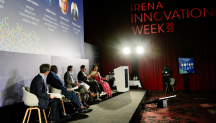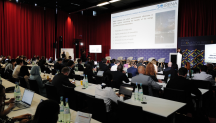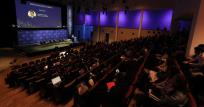
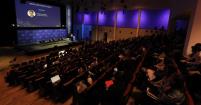
Innovation Week 2023: Direct Electrification (Renewable-powered Solutions) Day
Newsletter
Innovation Week 2023: Background
IRENA Innovation Week brings together leaders, experts, industry representatives, academics and policy makers to discuss cutting-edge innovations that can support and accelerate the global energy transition.
The 2023 edition is focused on the Renewable solutions to decarbonise end-use sectors.
The discussions this week will highlight tangible solutions to decarbonise energy intensive sectors such as transportation, buildings and industry using direct and indirect electrification, whilst also offering access to a unique and diverse network of experts, industry leaders and decision makers from IRENA’s 168 Members.
Stay tuned for updates and see the event programme here.
High level Dialogue – Innovation for the energy transition
According to IRENA’s 1.5°C Scenario, the share of electricity in total final energy consumption (TFEC) must increase from 21% in 2019 to 30% by 2030, and to 51% by 2050, and can be achieved with tremendous growth in technologies that run on electricity, many of which are already available. The end use sectors that are difficult to electrify directly, can be decarbonised using green hydrogen produced by renewably generated electricity, also known as indirect electrification.
During the opening session, policy makers discuss how innovation can accelerate the energy transition and what are the decarbonisation pathways for the end-use sectors.
🔜 #IIW2023 High-Level Dialogue on Innovation for the #EnergyTransition 💡@_AfricanUnion Commissioner @HEDrAbouZeid@EU_Commission Energy Commissioner @KadriSimson
— IRENA (@IRENA) September 25, 2023
The #Walloon VP @phh_Henry
Palau Finance Min. Kaleb Udui Jr.@calenergy Vice-Chair Siva Gunda@IRENA DG @flacamera pic.twitter.com/u8e6z4Td31
 In his welcome remarks, Roland Roesch, the Director of the IRENA Innovation and Technology Centre, invites the participants to discuss and explore innovations for smart electrification during this week's sessions. Read more on this topic in the Innovation Landscape 2023 report. |
In the Keynote speech, Francesco La Camera, Director-General of IRENA, reminded all that the IRENA’s World Energy Transitions Outlook calls for tripling annual renewable power additions to 1,000 GW on average until 2030 to keep 1.5°C climate target within reach. “We are pleased to witness a growing global consensus around the level of ambitions and targets for the Energy Transition. (…). How do we get there as soon as possible? The answer is Innovation!”, he concluded.
The Innovation Week 2023 delves into innovative solutions tailored to address challenges posed by the hard to abate sectors, outlined in the latest “Innovation Landscape Report for Smart Electrification” report.
“We believe that decision makers must adopt a systemic approach that combines innovations in technology and infrastructure with those in market design and regulation, system planning and operation, and business models,” said Francesco La Camera, wishing the event participants inspiring discussions with tangible outcomes this week.

Dr. Nawal Al-Hosany, the Permanent Representative of the UAE to IRENA delivered her Keynote speech saying: “As the presidency of COP 28, the UAE aims to strengthen ambitions and to transform them into action by all parties and stakeholders. Action is key, innovation is key!”. DR. Nawal welcomed IRENA’s Innovation toolbox on smart electrification, which guides countries through the solutions to the optimal strategy and implementation of systemic innovation.
“Bringing the world back to a 1.5°C trajectory will require a transformation greater than the industrial revolution.”
The panel discussion on the Innovation for the energy transition is in progress. High-level speakers are exchanging their views on the importance of innovation, their regional and country experiences, and needs.
“Energy touches on every sector and everyone’s lives. Everyone has a part to play,” said Kaleb Udui Jr., Minister of Finance, Republic of Palau. The panelists agree that technical collaboration, international cooperation, interconnectivity and the decentralization of supply chains are crucial.

 The EU Commissioner for Energy, Kadri Simson, underlined that innovation is crucial and the policy makers need to come out of their comfort zone to accelerate procedures supporting implementation of multiple solutions. The visualisaion shows the the key points made by the Commissioner. The discussion continued with the Amani Abou-Zeid, Commissioner for Infrastructure and Energy, African Union Commission focusing on Africa's needs. 'No one size fits all," she remarked. Innovative finance and business models are lacking, Africa only received 3% of global investment in renewables. Read more about Renewable Energy Market in Africa and its Regions. The panelists continued bringing up an array of innovations needed, including digitalisation, smart charging, electric vehicles, green hydrogen, smart heating and cooling. Find out more in the Innovation toolbox for smart electrification that outlines 100 innovations for decarbonisation of the end-use sectors and defines the blind spots for policy makers in their implementation.
|
High level dialogue on the Innovation for the energy transition: Visualisation of the key points
Day 1 sessions: Direct electrification (Renewable-powered solutions)
Watch the highlights below.
Power systems of the future: Infrastructure requirements for widespread electrification
IRENA’s analysis shows that meeting the goals of the 2015 Paris Agreement on Climate Change will require the share of electricity in the energy mix to rise from 22% in 2020 to 51% in 2050.
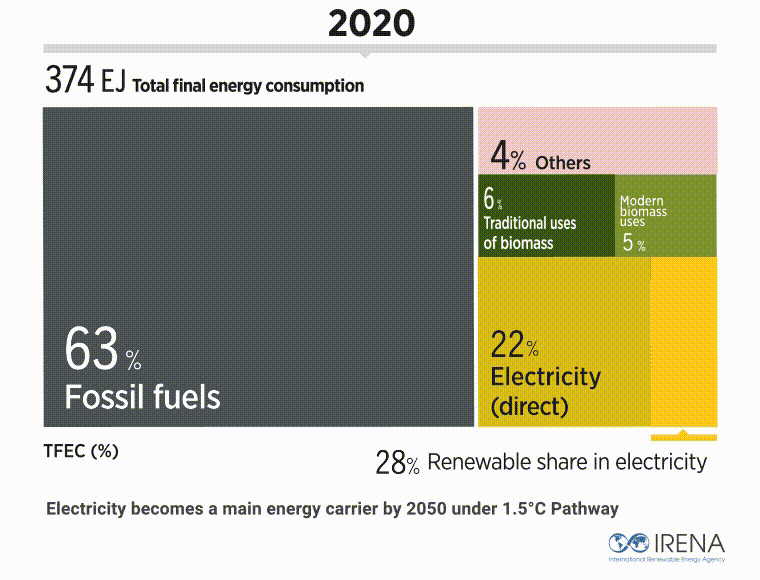
But the electrification of end uses alone is not enough. Electrification must be done in a “smart” way, both by interconnecting the power sector with other energy sectors, such as heat and mobility, and by enabling flexible sources across all energy sectors.
The power systems of the future need to accommodate a growing need for electrification while minimising the costs. The session in progress focuses on the infrastructure requirements for the widespread electrification. In his opening remarks, Dr Huafeng YAN, Chairman, CEPRI (SGCC), recalled the challenges posed by global energy transition and the importance of facilitating global energy transition. He underlined the importance of international cooperation. Follwing, Dr. Asami Miketa, the Head of Energy Transition Planning and Power Sector Transformation, IRENA set the scene saying that “smart electrification is the key to infrastructure planning. There is no one size fits all solution for smart electrification – the solution needs to be systemic.”
To find out more, see the report on the Smart Electrification with Renewables: Driving the Transformation of Energy Services, which provides policy makers with a conceptual overview of the global transition to electrification with renewables.
 During the panel discussion on the infrastructure requirements for widespread electrification, the panellists agreed that smart electrification is the key to infrastructure planning. Yet, there is no one solution fit all. The innovation must be systemic and focus not only on technology but also on the market design, business cases and regulatory matters. Investment in grid systems in necessary, yet it is crucial to use, repurpose and redesign the current infrastructure not to increase the final bill for the energy transition. Finally, consumers need to get fair value for their contribution to system flexibility to reap the benefits of the transition. |
Electrifying road transport
In the scene setting presentation for this session, Arina Anise, IRENA, provided an overview of the Innovation toolbox for smart electrification, focusing on Power to mobility innovation kits. "Smart electrification strategies can integrate variable renewable energy in the grid, decrease peak load, decrease grid congestion and minimize investment needs,” she remarked. The toolbox provides a range of flexibility options across transport sector which can be leveraged depending on the country's situation. For example, electrifying light duty vehicles and heavy-duty vehicles is different than electrifying 2 and 3- wheelers, more prominent in developing countries.
Siva Gunda, Vice Chair, California Energy Commission in his keynote underlined that “Climate change is making it difficult to fight climate change. We need to have a holistic plan to make the future energy system resilient and reliable.” He pointed out that demand flexibility and investments in clean transport and charging infrastructure are both critical for the decarbonisation of the transport sector.
The discussion continued with panelists outlining solutions for electrifying road transport, sharing their experiences in their implementation to date and discussing challenges ahead. The visualisation of the key points of the discussion below.
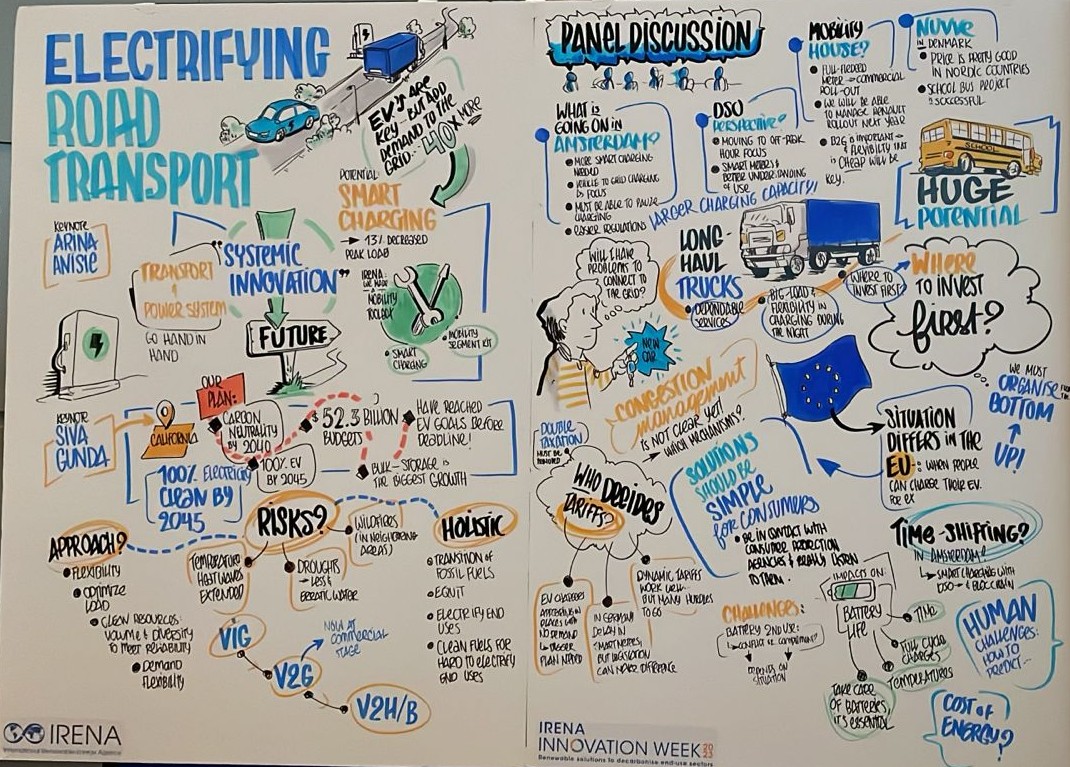
Along the events of the Innovation Week, young start-uppers engaged in the newest IRENA initiative, NewGen Renewable Energy Accelerator, discuss ideas and opportunities for a sustainable energy future.
At @IRENA Innovation Week #IIW2023, we are shining the spotlight on #IRENAImpact ✨
— IRENA (@IRENA) September 25, 2023
Our #NewGen start-uppers are showcasing their business, promoting youth innovation and sustainability in the energy sector ⚡️ pic.twitter.com/QuzFzsdnvS
Electrifying heating and cooling in buildings
This session focuses on how innovation in smart operation of heat pumps — from residential to district heating applications — can help address issues such as electricity systems congestion, peak loads and high infrastructure costs, while integrating heat pumps in power systems. The panelists discuss the importance of combining energy efficiency measures with electricity-based solutions, how to mobilise investments and how to ensure that transformation of the sector does not bring additional complexity to power systems.
The role of consumers in electrifying the heating and cooling in buildings cannot be underestimated. Getting the end users to adopt the energy-efficient solutions, such as installing heat pumps and solar photovoltaic (PV) systems, requires creating incentives that align with their interests and priorities. The key incentive is to ensure that the cost savings and benefits outweigh the costs of the initial investment. In addition, these solutions should be designed with a deep understanding of the local context, taking into account the climate, energy sources, regulations, culture, economics, and other factors specific to the region. Customization ensures that the solutions are not only effective but also practical and sustainable in the long term.
This session concluded Day 1 of the Innovation Week 2023: Direct electrification - Renewable-powered solutions. Check the event programme for the rest of the week here.

